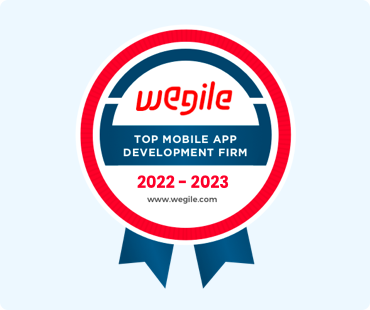We all know the tech industry moves faster than a speeding bullet. The perfect mobile app that you spend months developing today could very quickly become outdated or overshadowed by the competition tomorrow. That’s why outsourcing mobile app development has become such a necessity for companies striving to stay ahead of the game. But, with so many potential partners and options to outsource mobile app development Factors to Consider Before Outsourcing Mobile App Development hard to know which direction to turn.
That’s why we here at Wegile created this article: to make your decision for mobile app outsourcing that much easier. We’re like your trusty sidekick, always there to lend a helping hand when you need it most. Think of outsourcing as your journey – we’re here to guide you through it every step of the way. So, if you’re ready to take your app development into overdrive, strap on your seatbelt and get ready for the ride of your life!
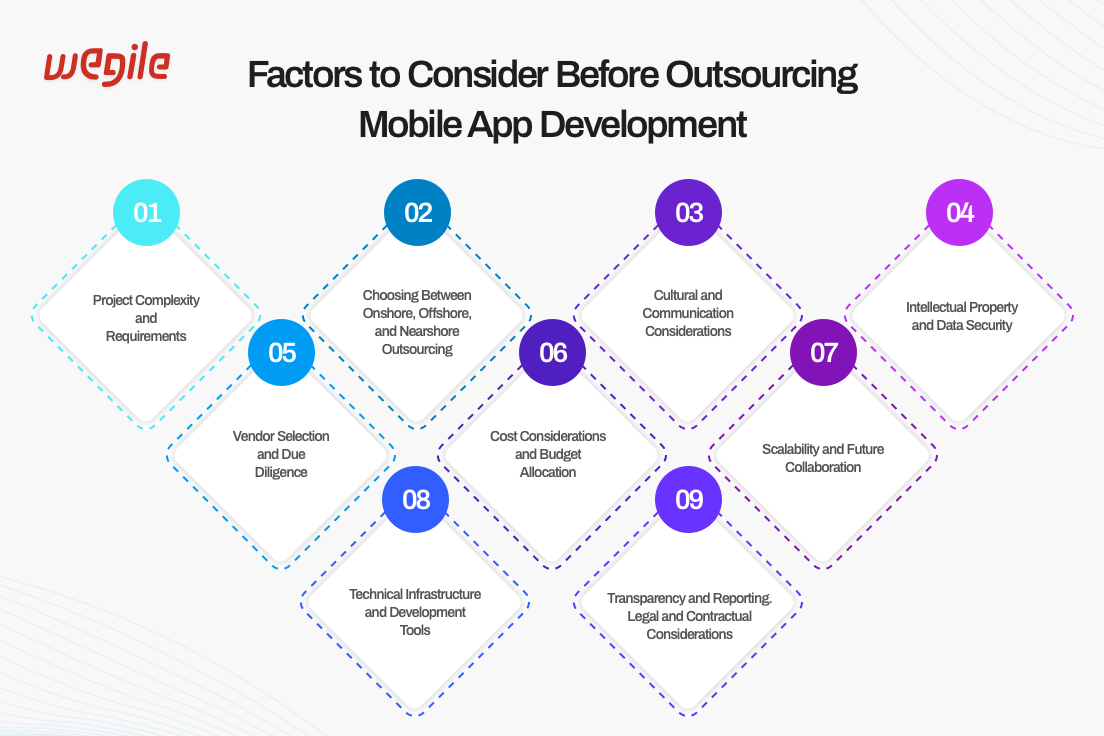
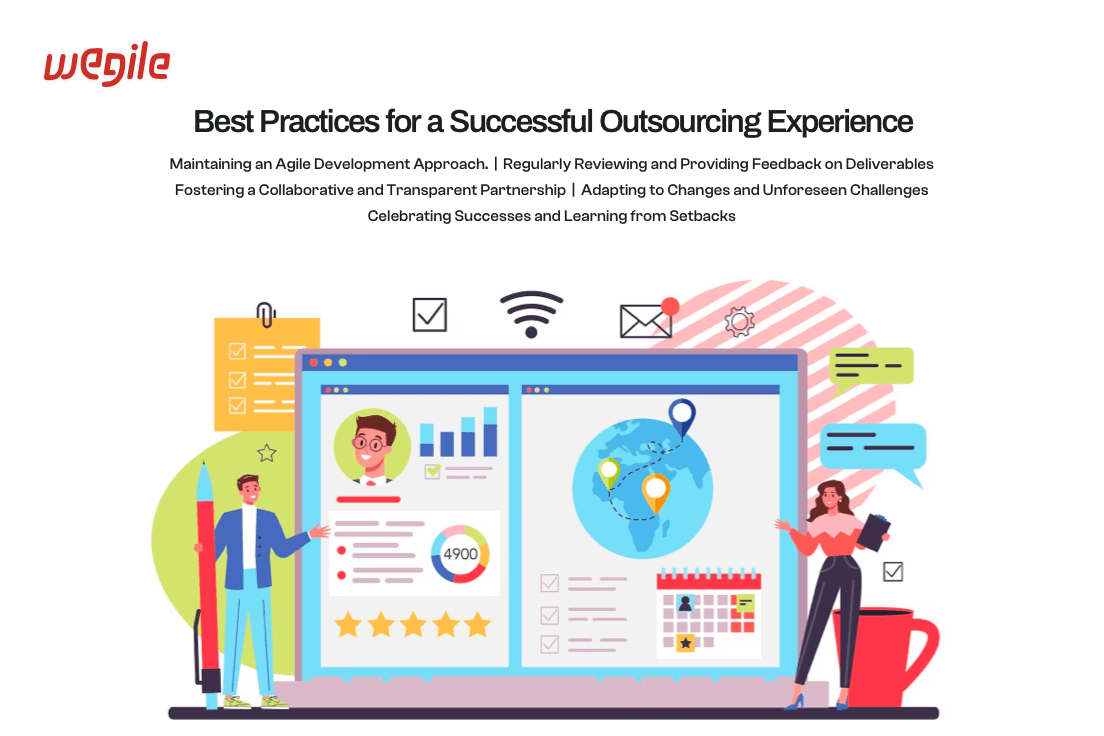
Outsourcing mobile app development can be highly rewarding if approached strategically and thoughtfully executed. Here are some essential best practices to ensure a smooth and productive mobile app outsourcing experience:
Iterative Progress: Adopt an agile development methodology that breaks the project into smaller iterations, allowing for continuous improvement and refinement.
Frequent Milestones: Break the project into manageable milestones with clearly defined objectives. Regularly reassess and adjust priorities to stay aligned with evolving goals.
Regular Sprint Meetings: Conduct frequent sprint meetings with the outsourcing team to assess progress, set goals, and prioritize tasks for upcoming iterations.
Collaborative Decision-Making: Encourage collaboration between your team and the outsourcing team in making decisions about feature prioritization and adjustments.
Scheduled Reviews: Set up regular review sessions to assess the progress of deliverables. This allows you to catch any deviations from your expectations early and address them promptly.
Constructive Feedback: Provide specific and constructive feedback. Highlight what works well and where improvements are needed. Clear feedback aids the outsourcing team in addressing issues promptly.
Alignment with Objectives: Ensure that each deliverable aligns with your project's overall objectives and meets your quality standards. This prevents deviations that might emerge if not monitored closely.
Open Communication Channels: Establish open lines of communication that facilitate easy interaction between your team and the outsourcing partner.
Shared Goals: Ensure a shared understanding of the app's goals, user personas, and overarching vision between your team and the outsourcing partner.
Collaborative Tools: Leverage collaboration tools and project management platforms to facilitate real-time updates and efficient communication.
Regular Meetings: Schedule regular virtual meetings to discuss progress, clarify doubts, and brainstorm solutions collaboratively.
Embrace Change Management: Recognize that change is an inherent aspect of the development process. Implement a structured change management approach that allows for seamless adaptation when requirements evolve.
Effective Crisis Communication: When unexpected challenges arise, prioritize clear and timely communication. Engage in discussions about potential solutions, assess their viability, and collectively make informed decisions as a unified team.
Resilience and Ingenuity: Foster a resilient mindset within both your in-house team and the outsourcing partner. Encourage resourcefulness and the pursuit of innovative solutions when facing challenges, nurturing a culture of proactive problem-solving.
Scenario-Based Planning: Proactively anticipate potential obstacles and develop contingency plans based on different scenarios. Having predetermined strategies for a range of challenges enables a swift and proactive response, minimizing disruptions to the project.
Flexible Project Timelines: Acknowledge that unforeseen challenges can impact project schedules. In the face of obstacles, engage in collaborative problem-solving with the outsourcing partner to adapt and find solutions that keep the project on track.
Acknowledging Achievements: Celebrate project milestones and successes, both big and small.
Recognize the efforts of the outsourcing team and the contributions of your own team.
Continuous Improvement: Use setbacks or challenges as opportunities for learning and improvement.
Conduct post-mortem reviews to analyze what went wrong and how similar issues can be prevented in the future.
Team Building: Organize team-building activities or social events, even in virtual environments, to strengthen the working relationship and boost team morale.
Feedback Loops: Establish feedback loops for constant improvement.
Forging a successful mobile app development outsourcing journey requires the right approach, and by following these practices, your mobile app outsourcing would definitely be successful. By embracing agile development, maintaining consistent communication, fostering collaboration, staying adaptable, and committing to continuous learning, you can confidently outsource mobile app development to companies like Wegile and achieve your app's desired outcomes.
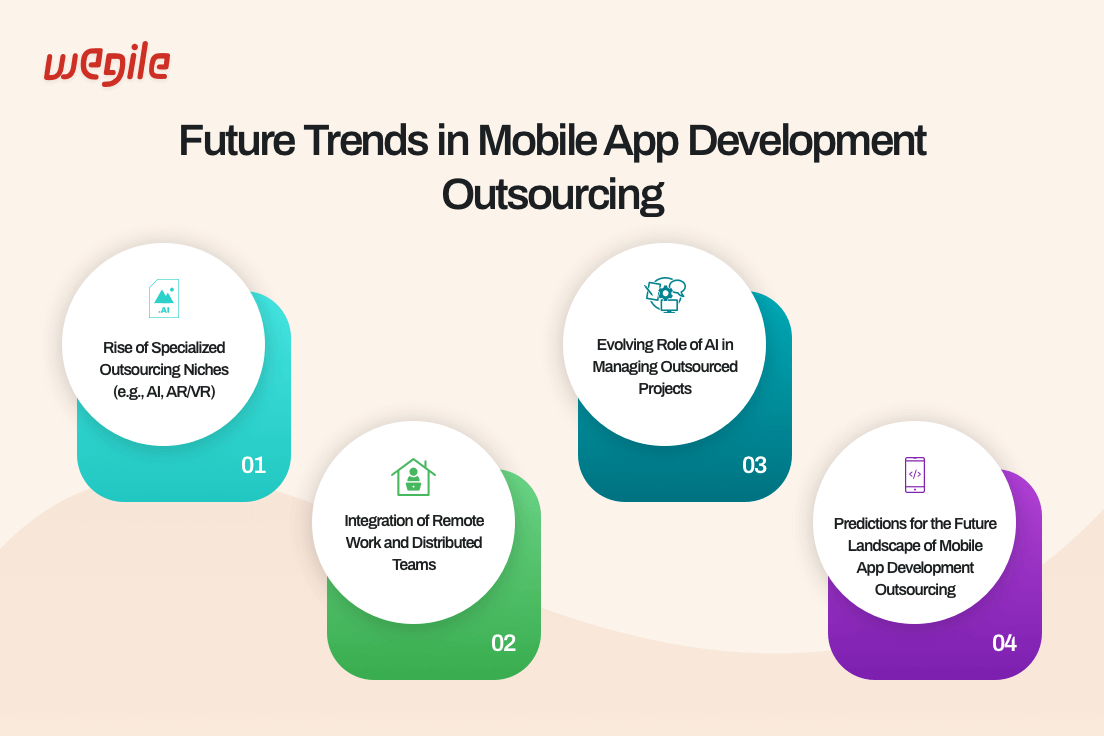
Niche Expertise: The outsourcing market will witness a surge in specialized niches, such as Artificial Intelligence (AI), Augmented Reality (AR), and Virtual Reality (VR) development.
Deeper Expertise: Clients will seek outsourcing partners with deep expertise in specific niches to tackle complex projects and integrate advanced technologies seamlessly.
High-Demand Domains: Niche areas like AI-driven apps for personalized user experiences and AR/VR applications for immersive engagement will see increased demand.
Remote Work Norms: Remote work will continue to be a significant aspect of outsourcing, with distributed teams collaborating across different time zones.
Global Talent Pool: Businesses will leverage a global talent pool, tapping into skilled professionals from various parts of the world.
Project Flexibility: Distributed teams offer agility, allowing for scaling based on project demands while optimizing costs and expertise.
AI-Powered Project Management: AI-driven tools and platforms will become integral in managing outsourced projects efficiently.
Predictive Analytics: AI algorithms will predict potential bottlenecks, project risks, and deviations from timelines, enabling proactive mitigation.
Enhanced Communication: AI chatbots and virtual assistants will facilitate real-time communication and address queries, fostering transparency and swift issue resolution.
Increased Collaboration: Collaborative tools and platforms will continue to evolve, fostering seamless communication and real-time collaboration among remote teams.
Rapid Prototyping: Faster development cycles, enabled by low-code and no-code platforms, will facilitate rapid prototyping and iterative development.
Quality Assurance: Outsourcing will see an increased emphasis on rigorous quality assurance processes, including automated testing, to ensure bug-free and user-friendly apps.
Security First: Heightened cybersecurity measures will be implemented in outsourcing to protect sensitive data and user privacy.
Sustainability Focus: Companies will consider environmental sustainability when outsourcing, looking for partners with eco-friendly practices.
Agile and DevOps Adoption: Agile methodologies and DevOps practices will be the norm, ensuring flexibility, continuous integration, and faster time-to-market.
Blockchain Integration: Blockchain technology may be increasingly integrated into outsourced app development for secure and transparent data handling.
5G-Powered Apps: With the proliferation of 5G networks, outsourced apps will leverage high-speed connectivity for enhanced user experiences.
IoT and Edge Computing: Outsourcing of IoT and edge computing app development will grow as the Internet of Things expands.
If you are planning to outsource mobile app development, keep in mind the aforementioned future trends in mobile app development outsourcing to ensure your mobile app outsourcing projects are a complete success.
When it comes to turning your dream mobile application into an actual product, nothing compares to having a team of expert outsource mobile app developers, experienced in the latest mobile app tech on your side.
With Wegile, you get the best of both worlds: top-notch expertise and a cost-effective solution so you can stay within your budget. Plus, Wegile provides timely and responsive customer service so that you always have peace of mind knowing we are looking out for you every step of the way. Trust us to make your vision come to life and outsource your mobile app development to Wegile today! Contact us right away.
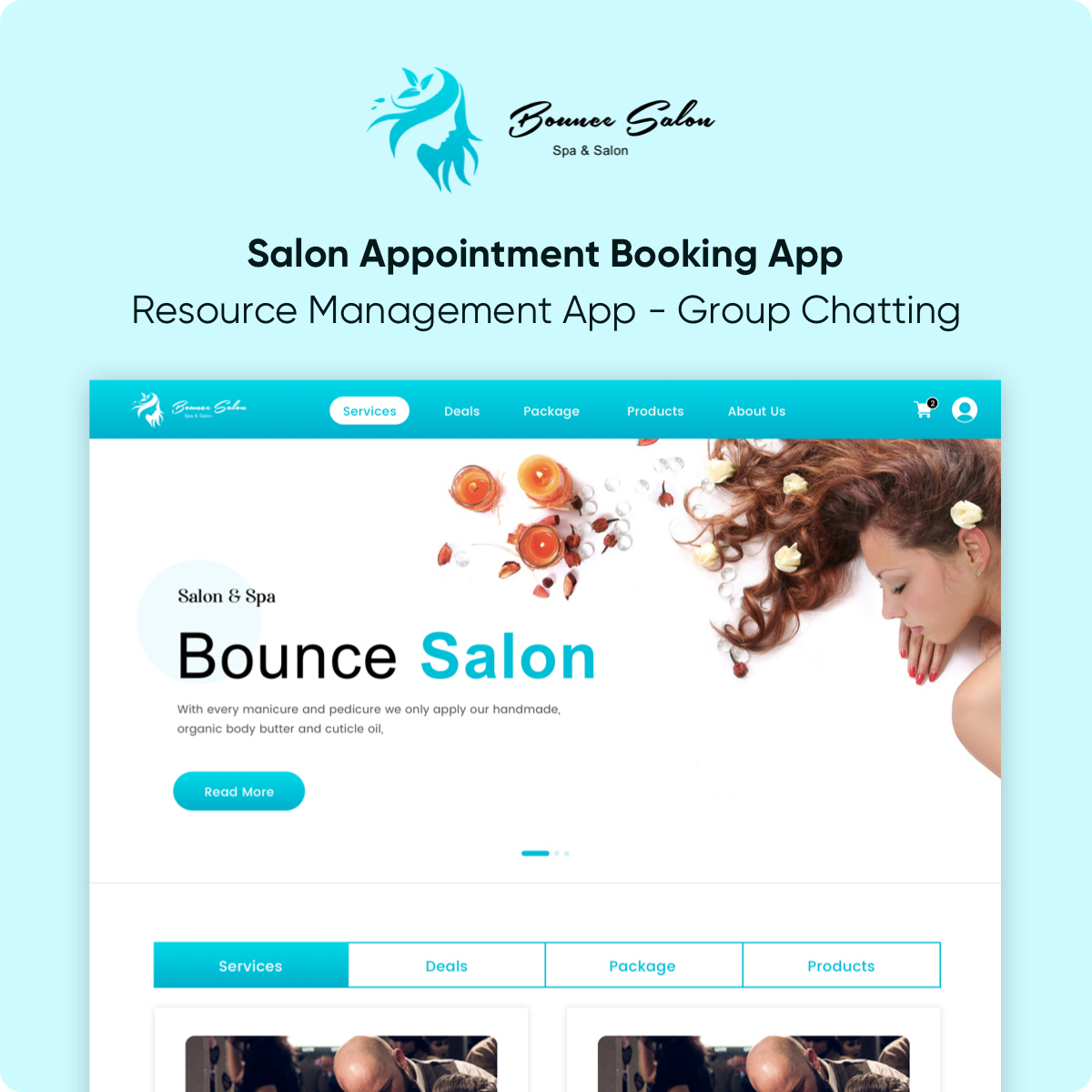

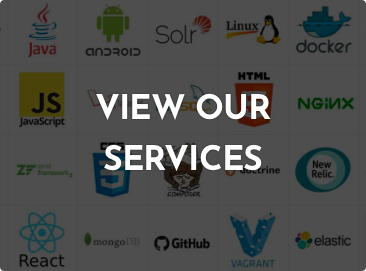 Browse Our Services
Browse Our Services
